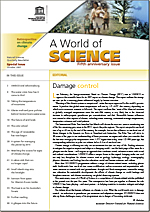Retrospective on climate change (20022007)
A World of Science - fifth anniversary issue OCTOBER 2007

CONTENTS
p 2 UNESCO and Johannesburg
p 6 The water crisis: how has it come to this?
p 10 Taking the temperature of mountains
p 14 Glacier melt and poor policies behind Central Asia's water woes
p 16 The future of arid lands
p 23 The solar school
p 26 The age of renewables has now begun
p 28 A system for managing the planet by 2015
p 34 Watching the oceans for signs of climate change
p 41 A carbon sink that can no longer cope?
p 45 Small islands step into the limelight
p 50 Saviours from space for Siberia's frozen tombs
p 55 The heat is on for Australia's forests
p 59 Further reading
p 60 A glimpse into the future
Quick link to .pdf version (3.18 MB);
See also ARCHIVES for A World of Science
EDITORIAL
Damage control
Last February, the Intergovernmental Panel on Climate Change (IPCC) met at UNESCO to approve the scientific basis for its 2007 report on climate change. This report outlines the strongest case yet for a warming planet influenced largely by human activities.
'Warming of the climate system is unequivocal', notes the report approved by the world's governments. It predicts that global mean temperatures will rise by 1.8°-4.0°C this century, depending on which socio-economic scenario is followed. The report confirms that 'most of the observed increase in globally averaged temperatures since the mid-20th century is very likely due to the observed increase in anthropogenic greenhouse gas concentrations' and that 'discernible human influences now extend to other aspects of climate, including ocean warming, continental-average temperatures, temperature extremes and wind patterns.'
The International Polar Year launched last March will devote the next two years to monitoring one of the few remaining grey areas in the IPCC report, the polar regions. The report can predict sea-level rise of up to 60 cm by the end of the century, for example, but not the influence on sea-level rise of future changes in the dynamic ice flows in Greenland and Antarctica. The Polar Year will strive to fill some of the gaps in our understanding of these processes, an urgent task when you consider that the last time average polar temperatures were 3-5°C higher than today, some 125 000 years ago, the corresponding reduction in polar ice volume led to 4-6 m of sea-level rise.
Climate change is affecting not only our environment but also our way of life. Finding solutions to mitigate the negative impacts and adapt to a changing world - see the back page of this issue for a glimpse into the future - will require an approach that combines sound, unbiased science with social and cultural considerations. UNESCO offers a unique forum in this regard, bringing under one roof not only key disciplines for climate science such as geology, hydrology, ecology, oceanography, physics, chemistry and biology but also education, social and human sciences, and culture.
More than 30 UNESCO programmes address a range of climate-related issues, including glacier melt, biodiversity loss, sea-level rise, ocean acidification, carbon economics and sequestration, saltwater intrusion in coastal soils and groundwater, drought and flood management, renewable energy use, education for sustainable development, the effects of climate change on world heritage and biosphere reserves, and climate monitoring via global observing systems.
This anniversary issue of A World of Science is a compilation of climate-related articles published in the journal over the past five years. This retrospective has been put together to illustrate the role UNESCO has been playing - and must pursue - in helping countries to monitor, mitigate and adapt to climate change.
The debate about the human influence on climate is over. What the world needs now is damage control, via reductions in greenhouse gas emissions and adaptation strategies. If UNESCO does not take up these challenges, many of its programmes are in danger of becoming irrelevant.
W. Erdelen
Assistant Director-General for Natural Sciences
- Publication Date: 30-12-2007
- - Retrospective on Climate Change

